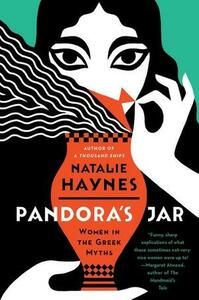You need to sign in or sign up before continuing.
Take a photo of a barcode or cover
got cheated by libby that it’s fiction 😢 tried my best to read but i just can’t focus on non-fiction.
adventurous
informative
medium-paced
adventurous
informative
reflective
slow-paced
funny
informative
reflective
medium-paced
funny
informative
reflective
medium-paced
Natalie Haynes dives deep into the forgotten and untold stories of many famous (and infamous) women from Greek mythology. Often misunderstood, misrepresented, or cast as side characters, Haynes explores the depth of characters such as Medusa, Penelope, Persephone, and Clytemnestra, giving fresh voices and perspective to these complex women.
I listened to the audiobook version of this story, narrated by the author herself. Well researched, moving, and often humorous, this analysis of women in Greek mythology is well worth the read. One of the most thought-provoking ideas I took away from this book was the fact that, due to the nature of myths and the mysteries of their origins, no one "version" of a myth is the correct one. So much literature and art has been lost in the thousands of years since these myths first began that to say only one representation of a myth-and especially only one representation of a woman in a myth- is the correct one is negatively limiting. It was a reminder that stories are ever evolving, that every idea is inspired by another, and that every time we read, we are only reading from one writer's perspective.
Reading Pandora's Jar encourages me to further explore the different poems, plays, and retellings of these complex, mythological women whose stories, despite their fantastical origins, often have so much in common with real women.
I listened to the audiobook version of this story, narrated by the author herself. Well researched, moving, and often humorous, this analysis of women in Greek mythology is well worth the read. One of the most thought-provoking ideas I took away from this book was the fact that, due to the nature of myths and the mysteries of their origins, no one "version" of a myth is the correct one. So much literature and art has been lost in the thousands of years since these myths first began that to say only one representation of a myth-and especially only one representation of a woman in a myth- is the correct one is negatively limiting. It was a reminder that stories are ever evolving, that every idea is inspired by another, and that every time we read, we are only reading from one writer's perspective.
Reading Pandora's Jar encourages me to further explore the different poems, plays, and retellings of these complex, mythological women whose stories, despite their fantastical origins, often have so much in common with real women.
informative
reflective
medium-paced
dark
informative
reflective
slow-paced
Natalie Haynes analyses the way women are perceived in Greek mythology, but not just from their ancient times. She offers insight into how they have been portrayed from their initial births up until now, offering studies on modern-day films, plays, TV shows and even memes. What’s essential to her writing is that she gives a multitude of ways in which women are presented, because it is hardly ever the same at all times, especially with such popular women as Medusa, Helen, Pandora of course and many more. Pandora’s Jar is an informative piece of work on society’s view of women and their roles in the Greek myths.
An important takeaway is that these myths are more often than not a culmination of multiple different stories; no version is ever the same. The point of this book appeared to me not to try and make every women mentioned seem like a hero, or less of a villain, but to uncover each character in depth. The analysis of Clytemnestra, for example, doesn’t quite remove her label of being a ‘bad wife’, but it challenges it, and forces you to think more deeply about her as a character, her motives and her own personality, and Haynes does this with all the women she talks about. What made this book so great to me was the fact that although I could see Haynes’ own judgement, I could also make out my own thoughts for myself with all the different views she gave.
Whilst this is a non-fiction book, it does have a story-telling aspect to it, especially as it takes you through Greek myths and plays, and Haynes’ writing is humorous and succinct which makes it an enjoyable read. Pandora’s Jar is a great read for anyone interested in learning more about women in Greek mythology and about context surrounding them all.
adventurous
funny
informative
medium-paced
Wow. There's so much here, I may need to read it again. Pandora's Jar is a wonderful companion piece to A Thousand Ships also by Natalie Haynes. Both dive deeply into the characters virtually ignored by history, one via fiction, Pandora's Jar via a historical examination of the literary record. It's hard to imagine a reader not coming away from these with a new perspective on the objectification, abuse and neglect of women in history. Even reminding us of the cultural expectations of the time, it's amazing that such disparity in human worth could be acceptable. Also, now I'm pretty sure the gods were really the monsters in most myths!




